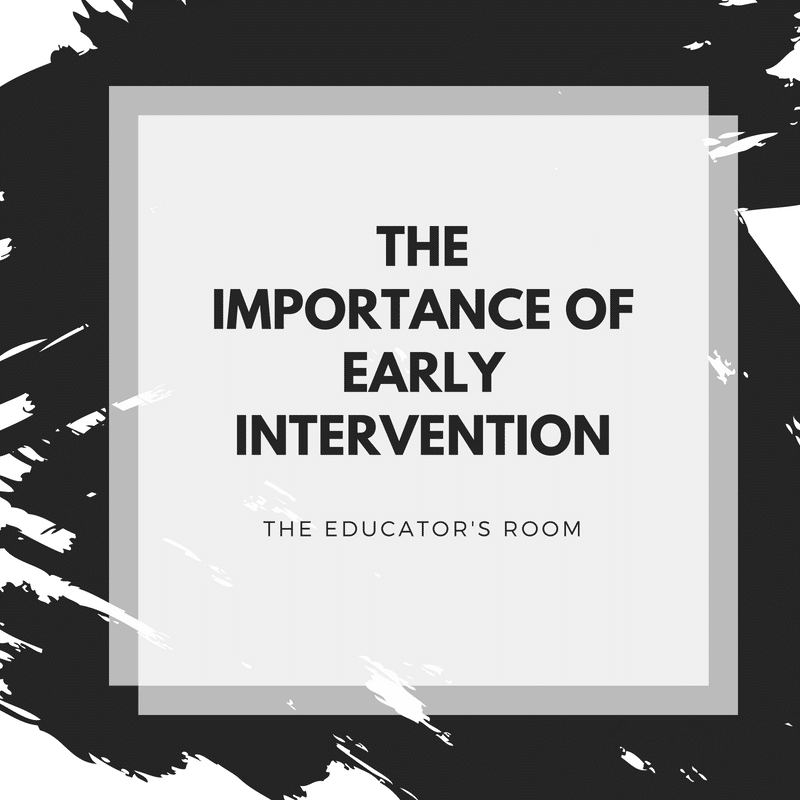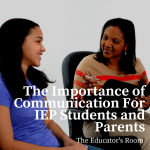I am a huge advocate for early intervention. Unfortunately, my district doesn’t always share the same philosophy. In my experience, students who are having difficulty in first and second grade (even some students in kindergarten) can be identified and remediated with the right supports. We are doing a huge disservice to children and families by waiting to identify a disability. In most cases, schools wait until a student is in third grade and failing, to intervene and place them on an IEP or 504 with accommodations specifically for testing, especially if the child has already been retained. This is one more step toward the testing game that many districts play that hurts students.
An important point for teachers to know is that there is more to a categorized disability than academics- it’s behavior. Having a student who struggles with behavior that affects his learning plus the learning of other students qualifies for being looked at for a disability that can be placed in a specified category. Several years ago I had a student who demonstrated atrocious behavior. He threw things. He screamed. He struggled with sensory input. Once we got to the root of the behavior we discovered there had been abuse. He was a very intelligent child, but his behavior impeded his learning and the learning of others. Even if there isn’t an actual learning disability, there may be a physical disability or an emotional/mental disability that the student could receive services for.
However many times, school psychologists and psychometrists are slow to jump on these cases so it is imperative as regular education and special education teachers to stay on top of these requests and ‘squeak’ like crazy to be heard. Many times, if the behavior is being noticed at home parents need to get involved and exercise their rights to have their child tested. Outside reports from a licensed psychologist and/or physician with a diagnosis are a quick way to put a child on the fast track to be tested in the school system. If there is not an outside report and the parents are not able to obtain one, but still feel that there is something going on, IDEA has a written process parents can go through to ensure that their child gets referred for testing in a timely manner. Please note, be very careful to check your district’s guidelines when mentioning the possibility of outside testing; there is a lot of responsibility in doing this.
Regular education teachers also have the ability to push for testing, even if parents are not experiencing behavior at home. This is one time where relationships with your families are so important. When I was teaching first grade as a regular education teacher I had several only children in class over the years who had demonstrated unacceptable behavior on an ongoing basis. Upon speaking with the parents they had not noticed any type of behavior occurring at home. Once we began going through observations and documenting behavior we were able to pinpoint patterns that only occurred in social situations where the student was feeling anxious and therefore acting out. Since he was not around peers at home the parents never saw the behavior. We were able to move from this point and walk the parents through what needed to happen next in order to get their child the help he needed. Taking the time early on to create great relationships with your parents pays off! If we had allowed this behavior to go on until third grade, even though he wasn’t academically behind at the time, this student would have missed out on several years of learning opportunities, plus would have hindered the learning of other students. Catching atypical learning and behaviors early, and getting the ball rolling for obtaining help helps everyone!
Just remember there is a fine line between a learning disability and being gifted and talented. Behavior that seems out if the ordinary age-appropriate behavior needs to be assessed. Sometimes this behavior leads to the child having a true issue that needs to be looked at as far as categorized disability. Sometimes this behavior demonstrates a gifted child who is bored or not challenged. Both of these scenarios need to be addressed. Don’t confuse the two! Both need to be identified and placed in appropriate classes. Every student deserves to be in an appropriate learning environment, whatever that looks like for them.







I totally agree Ms. Glass. We have to be diligent on early intervention. Intervention, albeit worth its weight in gold, is a time consuming and paperwork intensive process. A lot of times it is the red-tape and paperwork that limits early intervention. We have to improve the outdated workflows so that teachers can implement this best practice.
As a former administrator, I believe in supporting teachers in doing this work. The question is what are some good ways to support teachers in getting this real work done?
#SoTeachersCanTeach #ALLIn4Teachers #TeachersInTouch
Hajj
http://www.goteachersintouch.com